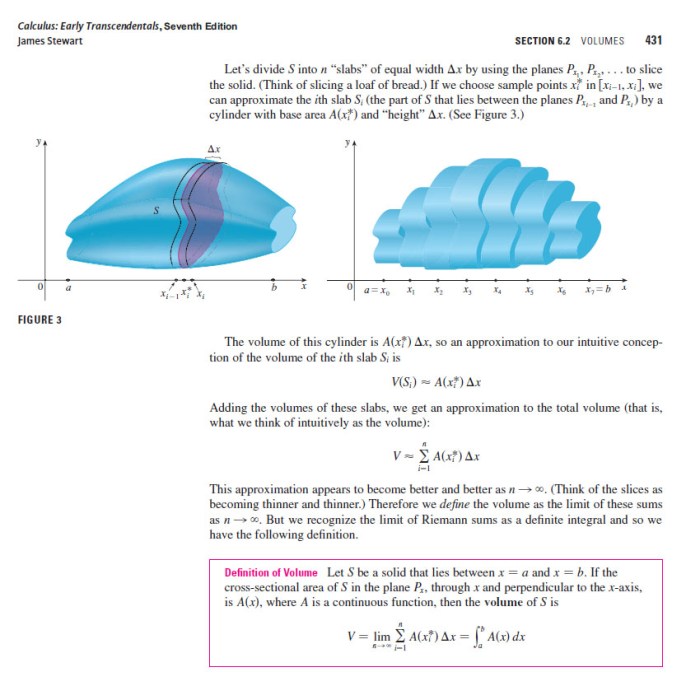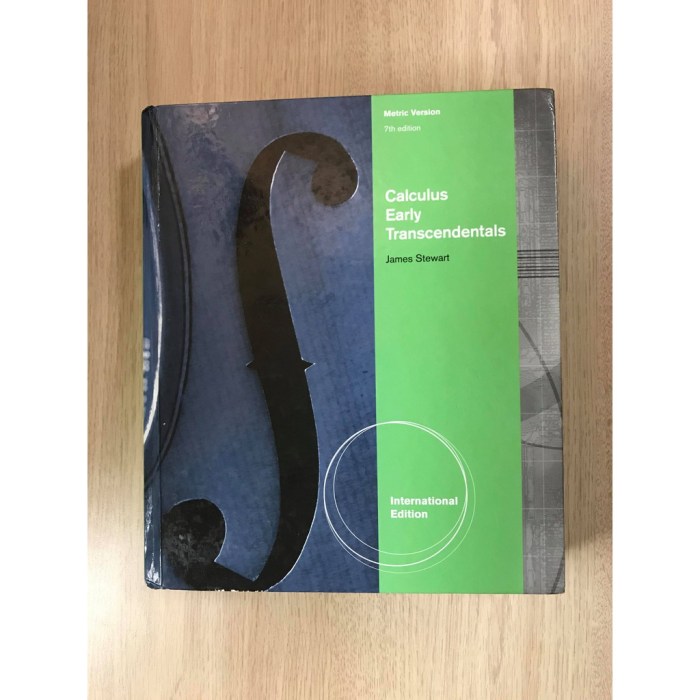Calculus early transcendentals edition 7th – Embark on an extraordinary mathematical odyssey with Calculus: Early Transcendentals, 7th Edition, a comprehensive textbook that illuminates the fundamental principles of calculus. This meticulously crafted resource empowers students to unravel the intricacies of this fascinating field, guiding them towards a profound understanding of its concepts and applications.
Delving into the depths of calculus, this textbook meticulously unfolds the historical evolution of this mathematical cornerstone, establishing its significance in shaping our understanding of the world. Catering to a diverse audience, it meticulously addresses the prerequisites and target readership, ensuring accessibility and relevance for all learners.
1. Overview of Calculus
Early Transcendentals, 7th Edition

Calculus: Early Transcendentals, 7th Edition, is a comprehensive textbook that provides a thorough introduction to the fundamental concepts of calculus. It is designed to prepare students for further studies in mathematics, science, and engineering, and is suitable for both high school and college-level courses.
The book covers a wide range of topics, including limits, derivatives, integrals, and differential equations. It also includes numerous real-world applications and examples to help students understand how calculus is used in various fields.
2. Content and Structure of the Textbook: Calculus Early Transcendentals Edition 7th

The textbook is organized into 14 chapters, each of which covers a specific topic in calculus. The chapters are arranged in a logical order, and each one builds on the concepts introduced in the previous chapters.
The following table summarizes the chapters, sections, and key concepts covered in the textbook:
| Chapter | Sections | Key Concepts |
|---|---|---|
| 1 | 1.1-1.7 | Functions, Limits, and Continuity |
| 2 | 2.1-2.7 | Derivatives |
| 3 | 3.1-3.9 | Applications of Derivatives |
| 4 | 4.1-4.9 | Integrals |
| 5 | 5.1-5.5 | Applications of Integrals |
| 6 | 6.1-6.7 | Logarithmic, Exponential, and Inverse Trigonometric Functions |
| 7 | 7.1-7.6 | Techniques of Integration |
| 8 | 8.1-8.7 | Applications of Integration |
| 9 | 9.1-9.6 | Differential Equations |
| 10 | 10.1-10.6 | Sequences and Series |
| 11 | 11.1-11.8 | Vectors and the Geometry of Space |
| 12 | 12.1-12.6 | Vector Functions |
| 13 | 13.1-13.5 | Partial Derivatives |
| 14 | 14.1-14.7 | Multiple Integrals |
Each chapter begins with a brief overview of the topics covered, and then it provides a detailed explanation of each concept. The explanations are clear and concise, and they are supported by numerous examples and exercises.
3. Features and Enhancements
The 7th edition of Calculus: Early Transcendentals includes a number of new features and enhancements that improve the learning experience and understanding of calculus.
- Interactive exercises:The textbook includes a number of interactive exercises that allow students to practice the concepts they have learned. These exercises are available online and can be accessed through the textbook’s website.
- Simulations:The textbook also includes a number of simulations that allow students to visualize the concepts they are learning. These simulations are available online and can be accessed through the textbook’s website.
- Visualizations:The textbook includes a number of visualizations that help students to understand the concepts they are learning. These visualizations are available online and can be accessed through the textbook’s website.
4. Applications and Real-World Examples
Calculus is used in a wide variety of fields, including science, engineering, economics, and business. The textbook includes numerous real-world applications and examples to help students understand how calculus is used in these fields.
- Science:Calculus is used in physics, chemistry, and biology to model and analyze the behavior of the natural world.
- Engineering:Calculus is used in civil engineering, mechanical engineering, and electrical engineering to design and analyze structures, machines, and systems.
- Economics:Calculus is used in microeconomics and macroeconomics to model and analyze the behavior of the economy.
- Business:Calculus is used in finance, accounting, and marketing to model and analyze the behavior of businesses.
5. Pedagogical Tools and Support Materials
The textbook is accompanied by a number of pedagogical tools and support materials that enhance the teaching and learning process.
- Instructor’s manual:The instructor’s manual provides a wealth of resources for instructors, including lesson plans, teaching tips, and solutions to the exercises and problems in the textbook.
- Student solutions manual:The student solutions manual provides solutions to the odd-numbered exercises and problems in the textbook.
- Online resources:The textbook’s website provides a number of online resources, including interactive exercises, simulations, and visualizations.
6. Comparison with Previous Editions

The 7th edition of Calculus: Early Transcendentals includes a number of significant changes and improvements over the previous editions.
- New content:The 7th edition includes new content on a number of topics, including differential equations, sequences and series, and vectors and the geometry of space.
- Updated examples and exercises:The 7th edition includes updated examples and exercises to reflect the latest developments in calculus.
- Improved pedagogy:The 7th edition includes a number of pedagogical improvements to make the textbook more user-friendly and effective.
Common Queries
What is the significance of Calculus: Early Transcendentals, 7th Edition?
Calculus: Early Transcendentals, 7th Edition is a comprehensive textbook that provides a rigorous and in-depth exploration of the fundamental concepts of calculus, catering to the needs of both students and educators.
What are the key features of Calculus: Early Transcendentals, 7th Edition?
Calculus: Early Transcendentals, 7th Edition boasts a range of innovative features, including interactive exercises, simulations, and visualizations, which enhance the learning experience and foster a deeper understanding of calculus.
How does Calculus: Early Transcendentals, 7th Edition support educators?
Calculus: Early Transcendentals, 7th Edition is accompanied by a suite of pedagogical tools and support materials, including online resources, videos, and interactive simulations, which empower educators to deliver engaging and effective lessons.
